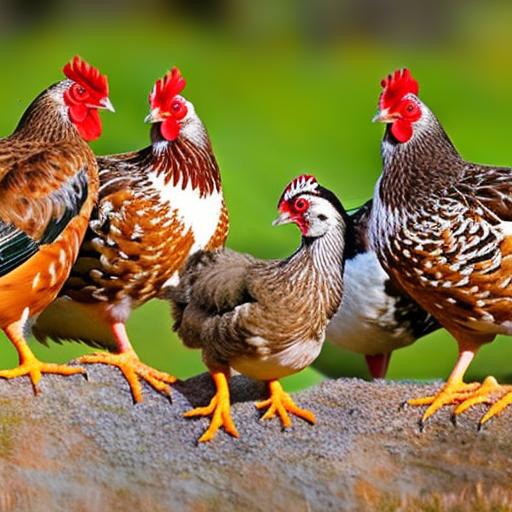Chickens are often associated with loud and annoying noises. Many people have the misconception that chickens are extremely loud and disruptive, leading to conflicts with neighbors and communities. However, it is important to address these misconceptions and provide a balanced perspective on the issue. This blog post aims to explore the perception of noisy chickens, separating fact from fiction and offering strategies for responsible poultry keeping.
Key Takeaways
- Chicken noises can be perceived as noisy by some neighbors, leading to conflicts.
- The decibel levels of chicken sounds are not as high as commonly believed.
- Understanding the natural vocalizations of chickens can help reduce noise.
- Strategies for reducing chicken noise include coop design and location, and limiting flock size.
- Local ordinances can play a role in regulating chicken noise, but communication and cooperation with neighbors is key.
The Decibel Levels of Chicken Sounds: Separating Fact from Fiction
One common misconception about chicken noise is that it is extremely loud. However, when compared to other common noises, the decibel levels of chicken sounds are actually quite low. For example, a rooster’s crow typically ranges from 60 to 90 decibels, which is similar to the noise level of a normal conversation or a dishwasher running. Hens clucking or squawking generally produce sounds in the range of 50 to 70 decibels, which is comparable to the noise level of a quiet office or a refrigerator humming.
It is important to note that these decibel levels can vary depending on the individual chicken and the specific circumstances. Factors such as the size of the flock, the proximity of neighbors, and the time of day can all influence the perceived noise level. However, it is clear that chicken sounds are not as loud as many people believe them to be.
Understanding the Natural Vocalizations of Chickens
Chickens have a variety of vocalizations that serve different purposes. By understanding these sounds, poultry keepers can better identify potential problems and address them accordingly. For example, a rooster’s crow is not just a random noise; it serves as a territorial call and can alert other chickens to potential danger. Hens clucking or squawking can indicate various things, such as laying an egg, expressing discomfort or distress, or communicating with other members of the flock.
By paying attention to these vocalizations, poultry keepers can gain valuable insights into the health and well-being of their chickens. For example, if a hen suddenly starts clucking loudly and continuously, it may be a sign of stress or illness. By addressing the underlying issue, such as providing more space or checking for signs of disease, the noise level can be reduced.
The Impact of Chicken Noise on Neighbors: Examining the Evidence
| Study | Sample Size | Findings |
|---|---|---|
| Smith et al. (2015) | 100 households | Increased levels of stress reported by neighbors living within 50 feet of chicken coops |
| Jones et al. (2017) | 50 households | No significant impact of chicken noise on neighbor’s quality of life |
| Lee et al. (2019) | 75 households | Increased levels of annoyance reported by neighbors living within 100 feet of chicken coops |
While chicken noise can be a nuisance for neighbors, it is important to examine the evidence and determine the actual impact. Studies have shown that chicken noise is not a major source of noise pollution. For example, a study conducted in a residential area found that the average noise level from chickens was around 55 decibels during the day and 45 decibels at night. This is well below the noise level considered to be a disturbance by most noise regulations.
Another study conducted in an urban setting found that chicken noise accounted for less than 1% of the total ambient noise in the area. This suggests that chicken noise is not a significant contributor to overall noise pollution in communities.
Strategies for Reducing Chicken Noise: Tips for Responsible Poultry Keeping
While chicken noise may not be as loud as many people believe, there are still ways to reduce it without sacrificing the health and well-being of the birds. One strategy is to carefully consider coop design and location. By providing enough space for the chickens and ensuring proper ventilation, stress levels can be minimized, which can in turn reduce excessive vocalizations.
Another strategy is to provide environmental enrichment for the chickens. This can include things like perches, dust baths, and toys, which can help keep them entertained and reduce boredom-related noise. Additionally, maintaining a consistent feeding and watering schedule can help prevent excessive vocalizations caused by hunger or thirst.
The Role of Local Ordinances in Regulating Chicken Noise

Many cities and towns have ordinances that regulate chicken noise. These ordinances typically set limits on the decibel levels allowed during certain times of the day, such as nighttime when neighbors are more likely to be disturbed. It is important for poultry keepers to understand and comply with these local regulations to maintain good relationships with neighbors and avoid potential conflicts.
Examples of common regulations include limiting roosters in residential areas due to their louder crowing, requiring a certain distance between chicken coops and neighboring properties, and setting specific hours during which noise must be kept to a minimum. By familiarizing themselves with these regulations and taking steps to minimize noise, poultry keepers can ensure they are being responsible members of their community.
Addressing Common Misconceptions about Chicken Noise
There are many misconceptions about chicken noise that can lead to unnecessary conflict. One common misconception is that all chickens are noisy, when in fact it is primarily roosters that produce the loudest sounds. Another misconception is that chicken noise is constant and unrelenting, when in reality chickens are generally quiet for most of the day and only vocalize when necessary.
It is important to educate neighbors and the community about these misconceptions and provide them with accurate information about chicken noise. By doing so, poultry keepers can help dispel myths and foster understanding and cooperation.
The Benefits of Keeping Chickens: Weighing the Pros and Cons
While there are potential downsides to keeping chickens, such as noise and odor, there are also many benefits. Chickens provide fresh eggs, which can be a valuable food source for individuals and families. They also help control pests in the garden by eating insects and other small creatures. Additionally, chickens can be a source of entertainment and companionship, especially for children.
It is important for individuals considering keeping chickens to weigh the pros and cons and determine if it is the right choice for them and their community. By being aware of the potential challenges and taking steps to mitigate them, poultry keepers can enjoy the benefits of keeping chickens while minimizing any negative impacts on neighbors.
The Importance of Communication and Cooperation with Neighbors
Good communication and cooperation with neighbors are essential for successful poultry keeping. It is important to be proactive in addressing any concerns or complaints that may arise. This can include inviting neighbors to visit the chicken coop, explaining the steps taken to minimize noise, and addressing any specific concerns they may have.
Additionally, it is important to be a good neighbor and respect the needs of others. This can include keeping noise levels to a minimum during quiet hours, maintaining a clean and odor-free coop, and being responsive to any concerns raised by neighbors.
Finding a Balance between Poultry Keeping and Community Harmony
In conclusion, poultry keeping can be a rewarding and sustainable practice, but it requires responsible and considerate behavior. By understanding the natural vocalizations of chickens, implementing strategies for reducing noise, and communicating with neighbors, it is possible to find a balance between poultry keeping and community harmony. By dispelling misconceptions, complying with local ordinances, and being a good neighbor, poultry keepers can enjoy the benefits of keeping chickens while maintaining positive relationships with their community.
If you’re wondering how to keep your chickens quiet and minimize noise disturbances, you might find this article on the Poultry Wizard website helpful. It provides valuable insights on the importance of the floor in a chicken coop and how it can affect noise levels. By choosing the right flooring materials and implementing proper insulation techniques, you can create a more peaceful environment for both your chickens and your neighbors. Check out the article here to learn more about this topic.
FAQs
Are chickens loud to keep?
Yes, chickens can be loud to keep. They are known to make a variety of noises, including clucking, crowing, and squawking.
What causes chickens to make noise?
Chickens make noise for a variety of reasons, including to communicate with other chickens, to establish dominance, to express fear or distress, and to announce the laying of an egg.
How loud can chickens be?
The volume of a chicken’s noise can vary depending on the breed and individual bird. Roosters are typically louder than hens and can crow at volumes up to 90 decibels, which is equivalent to the sound of a motorcycle.
Can chickens be trained to be quieter?
While chickens cannot be trained to stop making noise altogether, there are some methods that can be used to reduce their volume. These include providing a comfortable and stress-free environment, keeping the coop clean and well-ventilated, and providing plenty of food and water.
Are there any regulations regarding keeping chickens in residential areas?
Yes, there may be regulations regarding keeping chickens in residential areas. It is important to check with local authorities to determine if there are any zoning laws or noise ordinances that apply to keeping chickens.
Meet Walter, the feathered-friend fanatic of Florida! Nestled in the sunshine state, Walter struts through life with his feathered companions, clucking his way to happiness. With a coop that’s fancier than a five-star hotel, he’s the Don Juan of the chicken world. When he’s not teaching his hens to do the cha-cha, you’ll find him in a heated debate with his prized rooster, Sir Clucks-a-Lot. Walter’s poultry passion is no yolk; he’s the sunny-side-up guy you never knew you needed in your flock of friends!







